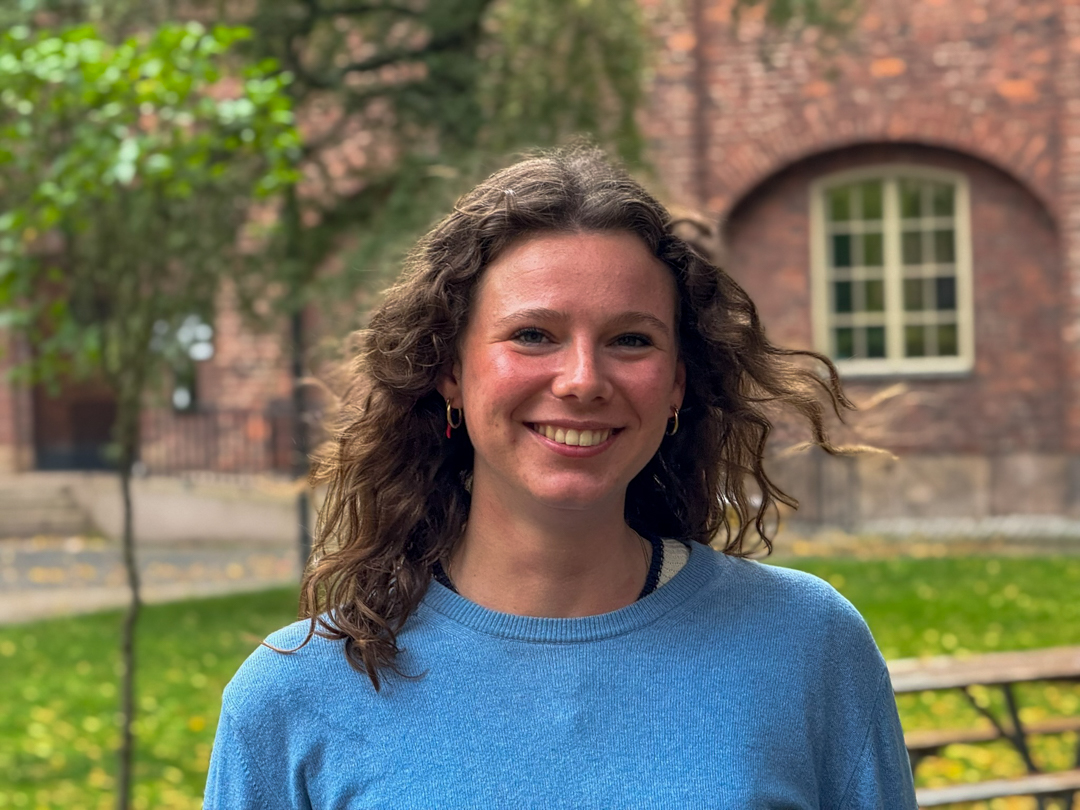Eloïse
Hi! I’m Eloïse, I’m half Italian and half Belgian, and I grew up in Brussels, Belgium. After doing a bachelor’s in bioengineering with a specialisation in chemistry at UCLouvain (Louvain-la-Neuve, Belgium), I decided I wanted to pursue a master’s abroad, and KTH quickly caught my eye, especially the Master of Industrial and Environmental Biotechnology. When the weather is good, I enjoy going on walks and sitting in the sun by the water, reading a book (usually a thriller).

What are the best aspects of your programme?
The best aspect of my program is its interdisciplinarity, which incorporates lab work, group work, coding, and lectures. I am learning about real-life applications in my field of study, which motivates me to understand how things work.
Have you chosen a specialisation track within the programme? Which track and why?
When I chose to apply to the industrial and environmental master’s, I instantly knew that I wanted to pursue the “environmental biotechnology” track. The courses are exactly what interests me and what I want to work in. I have not been limited by my choice, as there is a lot of overlap between the tracks, allowing me to follow every course that interested me.
What are some of your favourite courses so far?
So far, my favourite courses have been “Cultivation Technology” by Ton Van Maris, “Advanced Microbiology and Metagenomics” by Anders Andersson and my project course.
In Cultivation Technology, as the name suggests, we learned how to cultivate bacteria in an industrial setting through theoretical formulas and their applications in lab work. I enjoyed the class content and the professor.
In “Advanced Microbiology and Metagenomics”, we learned RStudio to analyse data. We then each chose a research question and answered it with the knowledge from the course. I enjoyed it so much that I then decided to do a project course on a similar subject at Scilife Lab where I had to chance to gain experience in working on RStudio.
How do studies at KTH differ from your previous studies?
One of the reasons I chose KTH is because of the academic calendar. In Belgium, semesters are typically 14 weeks long, followed by an intense period of studying and, eventually, exams. It is common to have 6 or 7 exams in one session, therefore, good time management and organisation are vital skills to develop. Unfortunately, those are not my forte, and I would end up doing everything stressed at the last minute. At KTH, courses are shorter but more intense, which works better for me as it forces me to work continuously. I have obtained better results and am generally happier with my work, and have achieved a better balance between my studies and my private life.
How is student life in Stockholm?
I believe student life is a fundamental aspect of attending a university. It helps to connect with the country and getting settled into the new foreign environment. KTH is a university with a lot of history and traditions. The chapters (faculty student sections) are a fun, welcoming (and cheap) environment to meet people and relax after a week of classes. Additionally, I love being so close to nature and being able to go for a swim after or before classes in the warmer months and on hikes on the weekend.
Between the chapters, the student associations and my own plans, I always have something fun to do on the weekend!
What do you want to do after graduating?
Honestly, I have no idea. At the moment, my only conviction is that I want to follow my morals and my values. I have chosen my degree with the goal of playing an active part in fighting climate change and pollution, particularly marine pollution; therefore, my main priority is to be part of the solution and not the issue. In addition to the purely scientific aspect of environmental issues, I am interested in policy-making and the vulgarisation of ecology, so, after gaining some field experience, I might orient myself in that direction.
I am not excluding doing a PhD however, I have never written a thesis, therefore, I am waiting to see how my degree project goes. At KTH, I had the chance to do a project course, which I really enjoyed, so I have a slight idea of what to expect, but it will obviously be very different.
I am a strong believer in “what is meant to happen will happen”, so I guess we’ll see where I end up!
